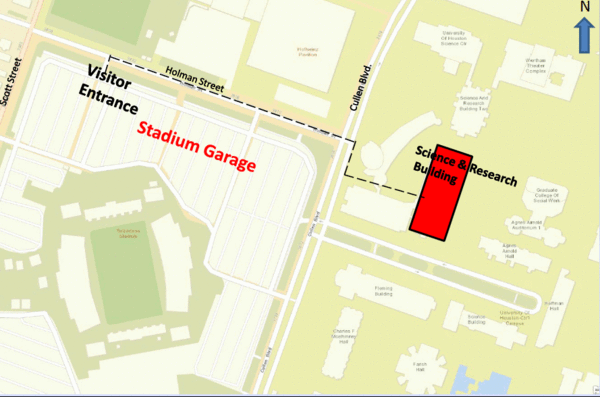Houston 2017

Dates[edit]
April 21-22, 2017
Registration[edit]
The two day class is open to the geophysics community. Preference is for geophysicist at the University of Houston. Some seats are reserved on a first come basis for non-University of Houston geophysicists. The registration form is here
Hosting Organization[edit]
SEG Wavelets is the University of Houston's SEG student chapter. It is devoted to promoting education in exploration geophysics. We work with professional organizations, industry professionals, University of Houston faculty, and other student organizations to bring students educational, social, and possible future employment opportunities. We invite professionals to give lectures on exploration geophysics at UH, outreach to schools and museums in Houston for geoscience education and organize workshops on O&G exploration. More details can be found on our website.
Location[edit]
Rm 223, Science & Research Bld1
University of Houston
3507 Cullen Boulevard
Houston, TX 77204-5007
Use these maps to the location of the school:
Prepare your computer before Friday, April 21st[edit]
Before the first day, you should install Madagascar on your computer. You can install the development version or the new stable version 2.0. Madagascar should install easily on a Mac or on Linux. For installation on Windows under Cygwin, see instructions.
If you want you can run on a virtual machine. Using a virtual machine is a good way to sample Madagascar, especially if you do not want to install Linux on your Window computer. On one test the elapse time was 15% longer. You can easily move from Linux window to windows on the Window system. When you are completed with Madagascar you can delete the virtual machine and all data associated. Installation is described on the wiki page: running madagascar on a virtual machine.
Agenda[edit]
| Draft program | ||
|---|---|---|
| Day 1 | Friday, April 21st | |
| 9:00-9:15 | Welcome (Wenyuan Zhang) | |
| 9:15-10:30 | Introduction to the Madagascar Framework (Sergey Fomel) | |
|
Madagascar provides a complete environment for organizing one's research, from new software development to running computational experiments to publishing the experimental results in papers and reports and archiving them for future usage. This shared environment enables an efficient exchange of research results with colleagues and sponsors. In this module, you will learn how to take the full advantage of the Madagascar environment to enhance research productivity and research collaboration. | ||
| 10:30-10:40 | Break | |
| 10:40-12:00 | First Look at Madagascar (Karl Schleicher) | |
|
Checking your installation, basic Madagascar Programs, basic SConstruct, and basic 2D marine processing. Exercises. | ||
| 12:00-13:00 | Lunch | |
| 13:00-15:00 | Wave Equation Modeling and Migration (Luke Decker) | |
|
Introduction to some of Madagascar's wave equation and modeling programs. | ||
| 15:00-15:10 | Break | |
| 15:10-17:00 | Exercises and additional topics. | |
| Day 2 | Saturday, April 22nd | |
| 9:00-12:00 | Madagascar exercise (Sergey Fomel) | |
| 12:00-13:00 | Lunch
| |
| 13:00-15:00 | Work session | |
|
Participants may continue to work on exercises and ask questions | ||
Organizers and Instructors[edit]
- Wenyuan Zhang (University of Houston)
- Sergey Fomel (University of Texas at Austin)
- Karl Schleicher (University of Texas at Austin)
- Luke Decker (University of Texas at Austin)

